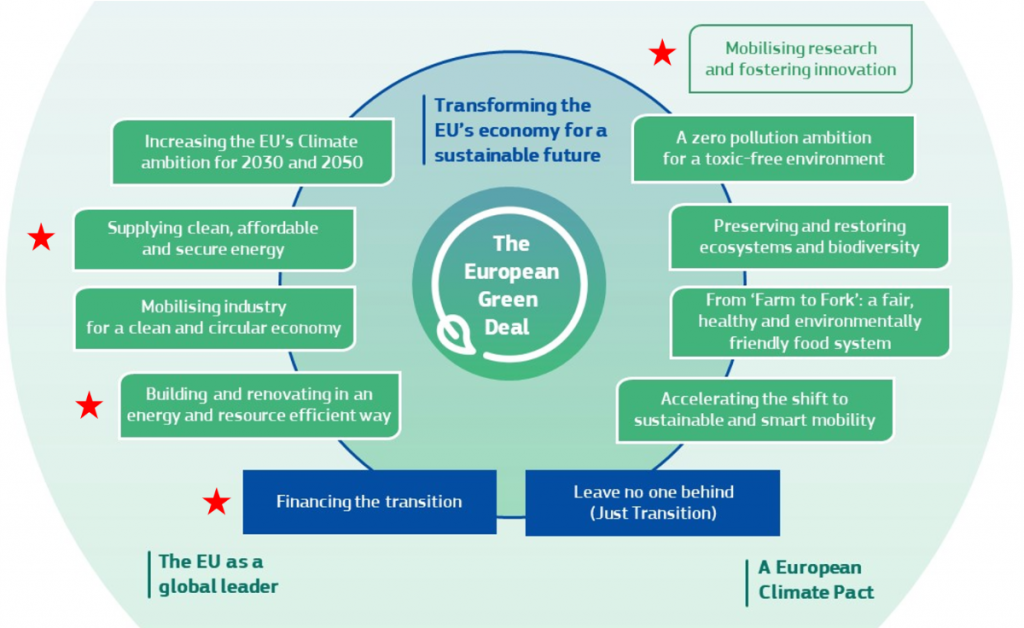A new pact is needed to ensure that citizens, in all their diversity, national, regional and local authorities, civil society and business work hand in hand with the EU institutions and advisory bodies.
The intention is to become the first carbon-neutral continent by 2050.
The declaration of intent is commendable. However, when looking at the proposals set out in the Green Deal for Europe, by the European Commission, one remains perplexed by the lack of mention of a paradigm shift in the economy. It talks about 50 measures focused on economic planning to take into account the threat of climate change and their variations according to 7 areas of action
- Clean, carbon-free energy.
- A sustainable industry.
- A cleaner construction and renovation sector.
- Sustainable mobility: The promotion of more sustainable means of transport (e.g. Accompanied combined transport).
- Preserved or restored biodiversity.
- Ensuring a more sustainable food chain from agriculture to consumption with the Farm to Fork (F2F) project.
- Elimination of pollution
- Mobilising industry for a clean and circular economy

Frans Timmermans (photo), Vice-President of the Commission responsible for the Green Pact presented it to MEPs, saying that “it will take investments of €260-300 billion per year – public and especially private – to achieve carbon neutrality by 2050”, i.e. no less than 25% of the EU budget and 1.5% of the Union’s Gross Domestic Product (GDP).
Nowhere is there any reference to the role of the SSE, as underlined by Pour la Solidarité in a document issued in February (in French). Once again, the contribution of the solidarity economy to ecological transition and social justice is overlooked because, although citizens are included in certain chapters among those who must participate in this “colossal” effort (sic), nowhere is it mentioned that specific attention and support will be given to the companies and associations that are already implementing on the ground the pious wishes set out in this pact. Mention is made of the circular economy, but nothing is said about the existing forms that already meet the specifications proposed by the Green Pact.
Whether clean energy (such as the one of energy coops like Enercoop), sustainable industry (cooperatives, including those that save jobs by recovering the work tool thanks to employees who join forces), construction (ecological housing), mobility (SSE is at the forefront of promoting soft mobility), preservation of biodiversity (fight against major projects that are useless for saving biotopes), CSAs and AMAPs for short food circuits, waste disposal, etc., the Green Pact does not mention the circular economy, but nothing about the existing forms that already meet the specifications proposed by the Green Pact. It is these initiatives that the EU should better support by increasing the share of the ESF and ERDF allocated to the solidarity economy and not only to the social economy, which is not the poor relation in this area. It is the dynamics of innovation that should be encouraged in all areas involved in the transition.
The Pact mentions education and training. The Commission will develop a European framework of competences to contribute to the development and assessment of knowledge, skills and attitudes relating to climate change and sustainable development.
RIPESS and its members are currently carrying out three training projects to invite SSE in initial training or that of elected representatives after having noted through a survey in the participating countries its quasi absence in training programmes. Can we expect from this new Pact a favourable reception of this work, whose recommendations we will put forward?
Subsidies on fossil fuels should be stopped. This is a good point. Its implementation is, moreover, a prerequisite for any policy to combat the damage caused by their use. It is difficult to see, however, how the Commission is going to succeed in imposing it, even if it is announced that funding is planned to support countries dependent on coal, for example. On the other hand, the citizens’ alliance can precipitate this movement, just as the consumers’ alliance for organic farming has done.
It is the role of a network to relay from the field to the institutions and vice versa the data essential to the orientation of a policy that makes sense for the evolution of society.
The Climate Pact will build on the series of dialogues with citizens and citizens’ assemblies that are underway across the EU, as well as the social dialogue committees.
The Aarhus Regulation should be revised to improve access to administrative and judicial review at EU level for citizens and NGOs who have doubts about the legality of decisions affecting the environment.
Available platforms can be used to simplify legislation and identify problematic cases.
While underlining the absence of any mention of SSE, one cannot question in advance the will to move European policy towards a decarbonised economy, but one must be vigilant to ensure that the windfall does not fall into the hands of large groups who will claim to “green” their methods when they use this funding to strengthen their supremacy at the expense of initiatives that are truly concerned with preserving the planet and social justice. It is time for Europe to encourage the multiplication of development adapted to local realities, supported by democratic assemblies where elected representatives and citizens consult and agree. The solidarity-based economy can testify to the relevance of these approaches, which succeed despite budgetary constraints and could give greater results if these obstacles were removed.
By Josette Combes














